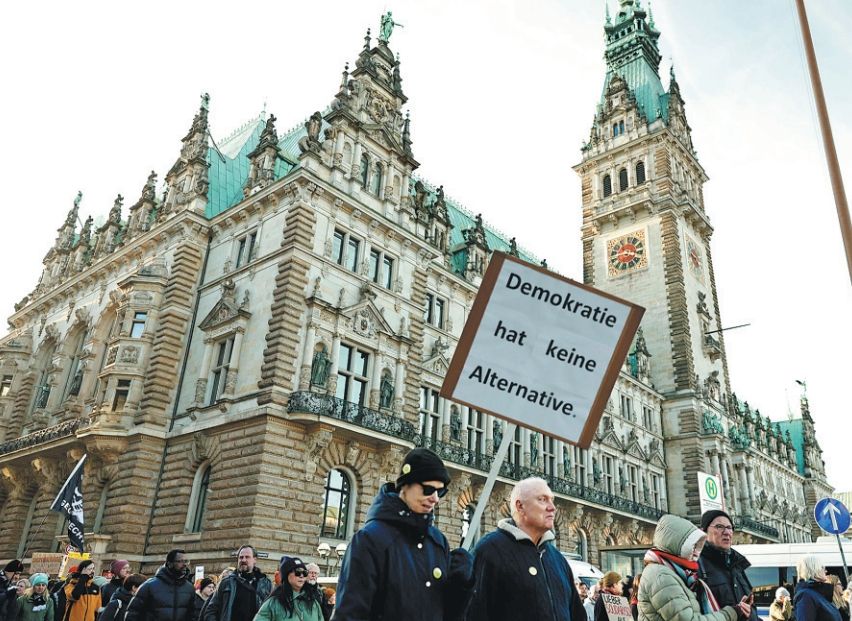source: editor:Zhang Wenni

A protester holds a placard reading "Democracy has no alternative" during a demonstration against far-right politics on Sunday in front of the city hall in Hamburg, northern Germany. MORRIS MAC MATZEN / AFP
Germany's right-wing party, Alternative for Deutschland, or AfD, has narrowly lost a regional election, its first test since a damning expose was published about its plans for governing and mass deportation of foreigners, which sparked massive protests nationwide.
Polls prior to the district election, in Saale-Orla in the southeastern state of Thuringia on Sunday, had indicated the AfD was likely to secure its second local government mandate amid growing support for anti-immigration policies.
The vote marked the first election following a report published earlier this month by investigative outlet Correctiv, which exposed a November meeting where AfD politicians and right-wing extremists discussed their plans for mass deportation of foreigners and unassimilated German citizens.
The story has sparked demonstrations in many cities and towns, with more than a million people protesting against right-wing extremism and in support of democracy over the last two weeks.
Christian Herrgott, representing the conservative Christian Democratic Union, defeated AfD candidate Uwe Thrum in the regional runoff.
Despite leading the race comfortably before the Correctiv report was released, Thrum only managed to gain 47.6 percent of the vote, while Herrgott secured 52.4 percent to emerge as the victor.
Thuringia is considered a stronghold for the AfD, and it currently holds approval ratings well over 30 percent there, as it does in several other eastern states, Deutsche Welle reported. Its support has also been increasing nationwide, hovering around the 20 percent mark.
Controversial plan
The district vote on Sunday was widely seen as a measure of civil society's mobilization against the anti-immigrant AfD, following the recent discovery of their deportation plan, The Guardian reported.
The Saale-Orla district has around 66,000 eligible voters, and is considered one of the poorest in the country, according to the German state statistics agency.
In a significant symbolic milestone last summer, AfD candidate Robert Sesselmann won the party's first county administrator post in Sonneberg, Thuringia.
Bjorn Hocke, AfD leader in Thuringia who is considered the party's most extreme figurehead, had stated that the party sees the upcoming statewide elections scheduled for September as a potential springboard for their entry into the federal government. Speaking to supporters after the victory in Sonneberg in June, Hocke said: "This is just the beginning."
Last week, AfD co-leader Alice Weidel said the party's success in Sonneberg could pave the way for their entry into the federal government as early as 2029.
Currently, the AfD is being excluded from power in Germany's 16 states, as other parties have ruled out forming any coalition with them.